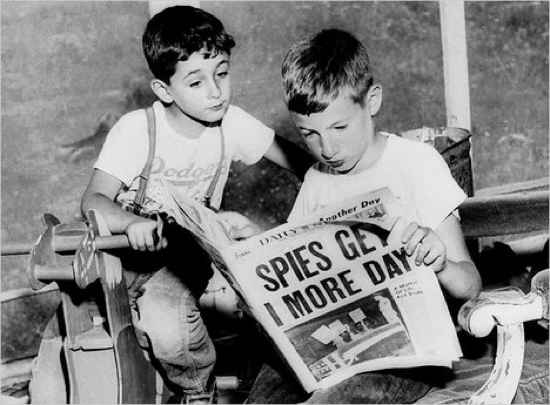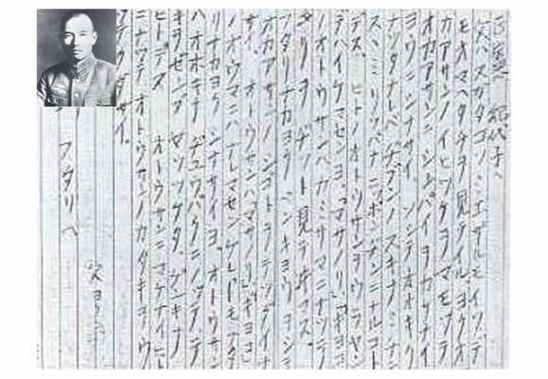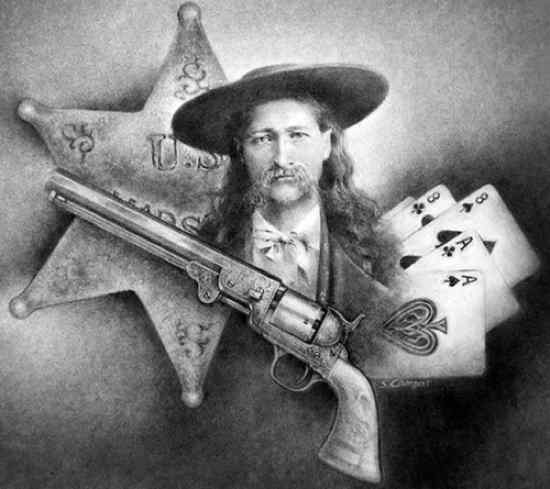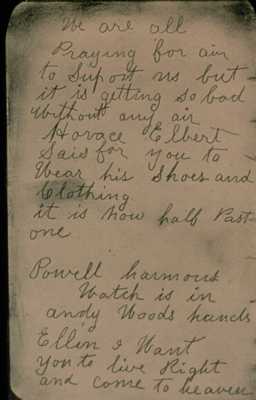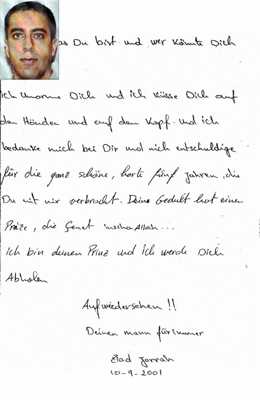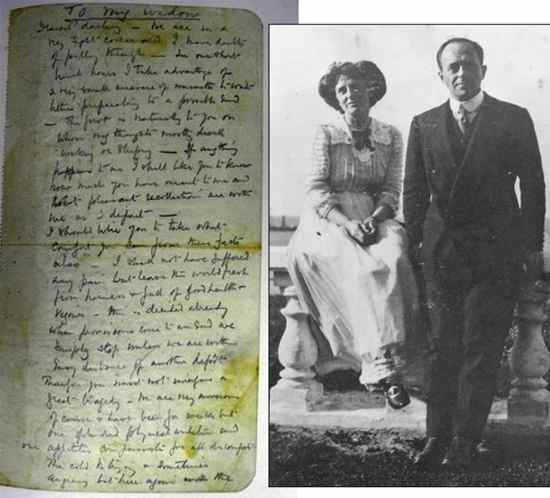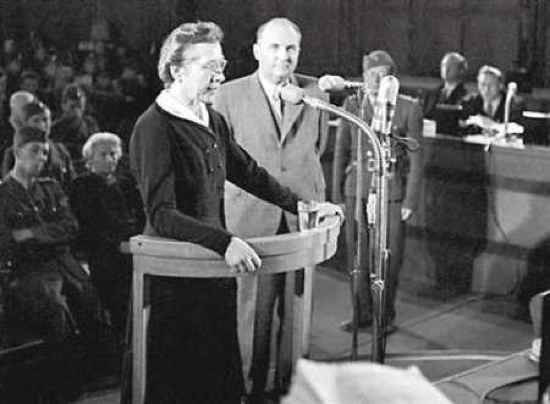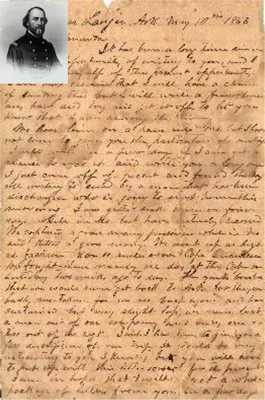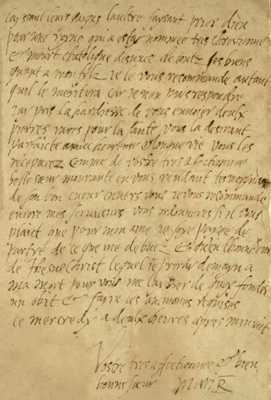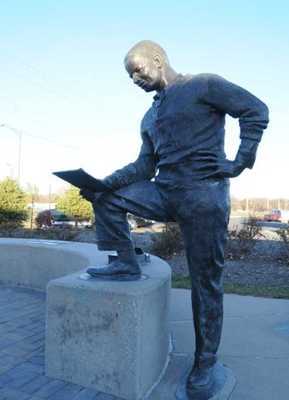Julius and Ethel Rosenberg were charged with conspiracy for passing information about the atomic bomb to the Soviet Union during a time of war. The Rosenbergs were convicted on March 29, 1951, and on April 5 were sentenced to death. The Rosenbergs remained on death row for twenty-six months. They were eventually executed by electric chair on June 19th, 1953. The following letter to their two sons was written on the day of their execution. Dearest Sweethearts, my most precious children, Only this morning it looked like we might be together again after all. Now that his cannot be, I want so much for you to know all that I have come to know. Unfortunately, I may write only a few simple words; the rest your own lives must teach you, even as mine taught me. At first, of course, you will grieve bitterly for us, but you will not grieve alone. That is our consolation and it must eventually be yours. Eventually, too you must come to believe that life is worth the living. Be comforted that even now, with the end of ours slowly approaching, that we know this with a conviction that defeats the executioner! Your lives must teach you, too, that good cannot really flourish in the midst of evil; that freedom and all the things that go to make up a truly satisfying and worthwhile life, must sometimes be purchased very dearly. Be comforted then that we were serene and understood with the deepest kind of understanding, that civilization had not as yet progressed to the point where life did not have to be lost for the sake of life; and that we were comforted in the sure knowledge that others would carry on after us. We wish we might have had the tremendous joy and gratification of living our lives out with you. Your Daddy who is with me in these last momentous hours, sends his heart and all the love that is in it for his dearest boys. Always remember that we were innocent and could not wrong our conscience. We press you close and kiss you with all our strength. Lovingly, Daddy and Mommy Julie Ethel Interesting Fact: The photo above shows the Rosenberg’s sons, Robert, 6, left, and Michael, 10, looking over at a 1953 newspaper concerning the fate of their parents. The brothers were eventually adopted by the lyricist and musician Abel Meeropol and his wife Anne. Michael and Robert later agreed that their father was a Soviet spy. The brothers also stated that the atomic bomb information their father passed to the Russians was, at best, superfluous. They also said their mother was convicted on flimsy evidence to place leverage on her husband and neither deserved the death penalty.
Melissa Nathan is a popular comic romantic novelist from the UK. In 2001 Melissa was diagnosed with breast cancer but continued her writing. Despite her courageous fight with the disease she died in April 2006 just after her son’s 3rd birthday at the age of 37. Her final novel, The Learning Curve came out in August 2006. Knowing that she would not live to see the published copies, she used the opening pages of the book as a final letter to her family. I am in the unusual position of knowing that this book will, in all probability, be published posthumously. And so please indulge me in a rather unusual set of acknowledgements. First, to my wonderful parents. You have given me a life suffused with love, support and friendship. I have been lucky enough to see eye to eye with you both, and look up to you at the same time. Please never feel that I have had a hard life. I have had 37 wonderful years, and I’m grateful to you both for giving me that. I am happy and at peace. My wonderful Andrew. I respect you as much as I love you, and that is saying something. You, of all people I know, will get through this. After all, you’ve got through nearly 12 years of marriage with me, and that’s no easy feat. I have been so lucky to know you. You have been my steady rock, my gentle giant, my best friend, my everything. I wish you a happy life, full of love and joy. And my amazing Sammy. I wanted to know you for longer, my love, but it wasn’t to be. Still, at only three years old, you have already left an imprint on my heart that will go with me, wherever it is I’m going. Motherhood made my life worthwhile. And you gave me that. What does a mother wish for her son? I wish you happiness. You have a wonderful daddy and a family who adores you. Go into the world knowing that while you were everything to your mother, you won’t have to deal with an annoying woman who can’t stop kissing you when you’re 15. I will be in the sky kissing you from afar. Interesting Fact: The Melissa Nathan Award For Comedy Romance was set up with criteria that Melissa drew up herself shortly before she died. She wanted to encourage and reward writers who can combine in a novel the magical, life-enhancing elements of humor and love.
Captain Kuno was a Captain for the Japanese air force during World War II and a volunteer kamikaze pilot. On May 23, 1945, the eve of his mission, he wrote his final letter in katakana to his 5-year-old son and his 2-year-old daughter. Katakana is a type of script characterized by short, straight strokes and angular corners, and is the simplest of the Japanese scripts. He wrote in this script because a child learns katakana in the lower grades of elementary school. Translated, the letter reads: Dear Masanori and Kiyoko, Even though you cannot see me, I will always be watching you. Obey your mother, and do not trouble her. When you grow up, follow a path you like and grow to be fine Japanese persons. Do not envy the father of others, since I will become a spirit and closely watch over you two. Both of you, study hard and help out your mother with work. I cannot be your horse to ride, but you two be good friends. I am an energetic person who flew a large bomber and finished off all the enemy. Please be persons who rise above me and so avenge my death. From Father Interesting Fact: In September 1985, his son Masanori visited Chiran, where his father spent his final night. He saw his father’s photo displayed at the Chiran Peace Museum for Kamikaze Pilots. A museum director saw Masanori, who was the living image of the photo and said to him, “You must be his son.”
James Butler Hickok known as Wild Bill Hickok was a skilled gunfighter and lawman from the American old west. Hickok was also a professional gambler between his law-enforcement duties. On August 2, 1876, Hickok was playing poker at Deadwood, in the Black Hills of Dakota Territory. A former buffalo hunter named John McCall walked in to within a few feet of Hickok, drew a pistol and shouted, “Take that!” The bullet hit Hickok in the back of the head, killing him instantly. Hickok had a premonition Deadwood would be his last camp, and expressed this belief to his friends who were traveling with him at the time. Shortly before his death, he wrote a letter to his new wife, which read: “Agnes Darling, if such should be we never meet again, while firing my last shot, I will gently breathe the name of my wife — Agnes — and with wishes even for my enemies I will make the plunge and try to swim to the other shore.” J.B. Hickok Wild Bill Interesting Fact: Legend has it that before Hickok was shot he had lost all his money and had to borrow $50 from the house to continue playing. When shot, he was holding a pair of aces and a pair of eights, all black. The fifth card had been discarded and its replacement had not yet been dealt. In poker, a two-pair of aces and eights is known as the dead man’s hand.
On May 19, 1902 en explosion occurred at the Fraterville Coal Mine in Tennessee. The disaster killed 216 miners making it the worst mining disaster in the state’s history. A few miners survived the initial blast and lived for several hours trapped in the mine and were able to write farewell letters to their families. Jacob Vowell was with his son Elbert who was just 14 year old and wrote a letter of love and faith to comfort his wife Ellen and family. He also mentions “Little Eddie” who is his previously deceased child. The letter reads: “Ellen, darling, goodbye for us both. Elbert said the Lord has saved him. Do the best you can with the children. We are all praying for air to support us, but it is getting so bad without any air. Horace, Elbert said for you to wear his shoes and clothing. It is now 1/2 past 1:00. Powell Harmon’s watch is in Andy Woods’ hand. Ellen, I want you to live right and come to heaven. Little Elbert said he trusted in the Lord. The bad air is closing in on us fast. Dear Ellen, I leave you in bad condition, but set your trust in the Lord to help you raise my little children. Elbert said for you all to meet him in heaven, for all of the children to meet us both. Raise the children the best you can. Oh how I wish to be with you. Goodbye, all of you, Goodbye. Bury me and Elbert in the same grave by little Eddie. Goodbye Ellen, Goodbye Lillie, Goodbye Jimmie, Goodbye Minnie, Goodbye Horace. Oh God, for one more breath. Ellen, remember me as long as you live. Goodbye darling. It is 25 minutes after 2:00. There are few of us alive yet. Jake and Elbert.” Interesting Fact: Fraterville lost all but three of its adult males. Hundreds of women were widowed, and roughly a thousand children were left fatherless. Some of the families lost as many as eight family members.
Ziad Jarrah was the hijacker-pilot of United Airlines Flight 93 which crashed into a field in a rural area near Shanksville, Pennsylvania killing all 44 people on board. Jarrah was 26 years old and was also one of the masterminds behind the September 11 attacks. On September 10, Jarrah spent the last evening of his life writing a four page letter to his girlfriend Aysel Senguen in Bochum Germany whom he had made marriage plans with. The letter never reached her because she had moved out of her apartment after entering witness protection shortly after the attacks. The letter was returned to the United States by the postal services, where it was discovered and delivered to the FBI. In the first page translated from German he writes: “I don’t want you to become sad, I still live somewhere else, where you can’t see me and can’t hear me, but I will see you and know how you are. And I will wait for you until you come to me. Everybody has his time and will move sometime. I am guilty that I raised your hopes about wedding, marriage, children and family” The letter also contains phrases such as: “You ought to be very proud, because it is an honor and you will see the results and everybody will be happy”. In another portion he writes “I did what I was supposed to do” The last page of the letter (shown above) translates to: Remember what you are and who would deserve you. I hug you and kiss you on your hands and on the head. And I thank you and apologize for the very wonderful, hard five years that you spent with me. Your patience has a [unreadable] Allah …I am your prince and I will pick you up. Goodbye!! Your man forever Ziad Jarrah 10-9-2001 Interesting Fact: Before the letter was revealed in November 2001, his girlfriend Aysel knew others thought the evidence was overwhelming that Ziad had been at the controls of the airliner, and a critical component in the deadliest terrorist attack in history. She nonetheless told investigators that he was alive; that he would one day come back and show up at her door with gifts, telling her not to worry, that there had been problems but now everything was fine and they would have the life they had planned.
What makes this letter all the more heartbreaking is that Scott opens his last letter to his wife with the words “To my widow” Captain Robert Scott was a Royal Navy officer and explorer who led expeditions to the Antarctic regions. In March 1912, Scott was on his way back from the South Pole in sub-zero, conditions. The three surviving members of his party were in their tent suffering from frostbite and malnutrition. The following words below are just a few excerpts from his last letter to his wife Kathleen before his death from the elements. To my widow. Dearest darling. It is not easy to write because of the cold – 70 degrees below zero and nothing but the shelter of our tent… We are in a very tight corner and I have doubts of pulling through. In our short lunch hours, I take advantage of a very small measure of warmth to write letters preparatory to a possible end. If anything happens to me, I should like you to know how much you have meant to me. I must write a little letter for the boy if time can be found to be read when he grows up. Dearest that you know I Cherish no sentimental rubbish about remarriage. When the right man comes to help you in life, you ought to be your happy self again. Make the boy interested in natural history if you can. It is better than games. Try to make him believe in a God; it is comforting. Oh my dear, my dear, what dreams I had of his future and yet, oh my girl, I know you will face it stoically – your portrait and the boy’s will be found in my breast. What lots and lots I could tell you of this journey. What tales you would have for the boy, but, oh, what a price to pay. To forfeit the sight of your dear, dear face. “I think the best chance has gone. We have decided not to kill ourselves but to fight it to the last for that depot but in the fighting there is a painless end so don’t worry.” Interesting Fact: The letter (shown above) was found along with the three explorer’s bodies several months after their deaths and just 11 miles from their supply camp. Scott’s wife Kathleen remarried politician Edward Hilton Young in 1922 and became Baroness Kennet when he was ennobled in 1935. His son, then 3, went on to graduate from Trinity College, Cambridge and have a distinguished career in ornithology.
Milada Horáková was a Czech politician and was elected a Member of Parliament, where she remained until the Communist coup in February 1948. Despite being urged by her friends to leave Czechoslovakia, she remained in the country and was politically active. On September 27, 1949, the Communist authorities arrested her and charged her with conspiracy against the state. Despite being tortured she refused to accept the legality of the current government. She was sentenced to death after a widely publicized show trial. The Communist authorities then offered her clemency in exchange for a confession, but she refused and was executed by hanging. The night before her execution her jailers allowed Horáková to write three letters, one to her husband, one to her sixteen year old daughter Jana, and one to her mother-in-law, who would raise her daughter. Part of the letter to her daughter reads: “The reason was not that I loved you little; I love you just as purely and fervently as other mothers love their children. But I understood that my task here in the world was to do you good … by seeing to it that life becomes better, and that all children can live well. … Don’t be frightened and sad because I am not coming back any more. Learn, my child, to look at life early as a serious matter. Life is hard, it does not pamper anybody, and for every time it strokes you it gives you ten blows. Become accustomed to that soon, but don’t let it defeat you. Decide to fight.” Interesting Fact: On November 14, 2006, at the Czech Embassy in Washington, D.C., Horakova’s daughter Jana accepted the Truman-Reagan Medal of Freedom Award from the Victims of Communism Memorial Foundation for her mother.
A list such as this would not be complete without Sullivan Ballou’s eloquent, heart filled letter to his wife Sarah. It was written in 1861, one week before the union soldier was killed at the First Battle of Bull Run which was the first major land battle of the American Civil War. The abbreviated version of the letter below was featured in Ken Burns Civil War documentary. Dear Sarah: The indications are very strong that we shall move in a few days – perhaps tomorrow. And lest I should not be able to write you again I feel impelled to write a few lines that may fall under your eye when I am no more. I have no misgivings about, or lack of confidence in the cause in which I am engaged, and my courage does not halt or falter. I know how American Civilization now leans upon the triumph of the government and how great a debt we owe to those who went before us through the blood and suffering of the Revolution. And I am willing – perfectly willing – to lay down all my joys in this life, to help maintain this government, and to pay that debt. Sarah, my love for you is deathless, it seems to bind me with mighty cables that nothing but omnipotence can break; and yet my love of Country comes over me like a strong wind and bears me irresistibly with all those chains to the battlefield. The memory of all the blissful moments I have enjoyed with you come crowding over me, and I feel most deeply grateful to God and you, that I have enjoyed them for so long. And how hard it is for me to give them up and burn to ashes the hopes and future years, when, God willing, we might still have lived and loved together, and see our boys grown up to honorable manhood around us. If I do not return, my dear Sarah, never forget how much I loved you, nor that when my last breath escapes me on the battle field, it will whisper your name… Forgive my many faults, and the many pains I have caused you. How thoughtless, how foolish I have sometimes been!… But, O Sarah, if the dead can come back to this earth and flit unseen around those they love, I shall always be with you, in the brightest day and in the darkest night… always, always. And when the soft breeze fans your cheek, it shall be my breath, or the cool air your throbbing temple, it shall be my spirit passing by. Sarah do not mourn me dead; think I am gone and wait for me, for we shall meet again… Interesting Fact: Sullivan Ballou’s letter was never mailed. It was found in Ballou’s trunk after he died and delivered to Ballou’s widow by Governor William Sprague, His wife, Sarah, never remarried. She later moved to New Jersey to live out her life with her son, William. She died in 1917 at the age of 81 and is buried next to her husband.
Mary Stuart was Queen of Scots, briefly Queen of France and aspired to be Queen of England. Her Cousin, Queen Elizabeth ordered her arrest, because of the threat presented by Mary who was considered the rightful ruler of England by many English Catholics. She was sentenced to death for her alleged involvement to assassinate Queen Elizabeth. On the morning of February 8th, 1587 with her execution just six hours away, Mary wrote her last letter to Henri III, King of France who was the brother of her late husband. In the letter, Mary claims that she is being persecuted solely for her faith and for her rights to the English throne. She also asks Henri to take care of her servants. Translated from French the last part of her letter (shown above) reads: I have taken the liberty of sending you two precious stones, talismans against illness, trusting you will enjoy good health and a long and happy life. Accept them from your loving sister-in-law, who, as she dies, bears witness of her warm feelings for you. Give instructions if it please you, that for my soul’s sake part of what you owe me should be paid, and that for the sake of Jesus Christ, to whom I shall pray for you tomorrow as I die, I be left enough to found a memorial mass and give the customary alms. Wednesday at two in the morning, Your most moving and most true sister, Marie R. Queen of Scotland.” Interesting Fact: During her execution it is said that it took at least two strikes to decapitate Mary. The first blow missed her neck and struck the back of her head. At which point the Queen’s lips moved. Her servants reported they thought she had whispered the words “Sweet Jesus.” The second blow severed the neck, except for a small bit of connective tissue that the executioner cut loose by using the axe as a saw. When the executioner picked up the severed head to show it to those present, it was discovered that Mary was wearing a wig. The former queen’s head rolled on the floor with the headsman holding just her wig.
This letter doesn’t quite fit with the other situations on the list because, although sad, it is very inspirational so I have included it as a bonus. Jack Trice was the first black football player from Iowa State College. Trice majored in animal husbandry, with the desire to go to the South after graduation, and use his knowledge to help black farmers. His wife, Cora Mae was also a student and studied home economics. On October 6, 1923 he played his first major football game against the University of Minnesota in Minneapolis. Because of his color, Trice was forced to stay at a different Minneapolis hotel from his teammates. During the game he suffered a broken collarbone. He continued to play until the third quarter when he was thrown on his back and trampled by three Minnesota players. Trice was removed from the game and sent to a Minneapolis Hospital. The doctors declared him fit to travel by train back to Ames Iowa with his teammates. Two days later, Trice died from hemorrhaged lungs and internal bleeding as a result of the injuries he sustained during the game. Before his funeral a letter was found in his jacket pocket that he had written to himself on hotel stationary the night before the game. The letter reads: “My thoughts just before the first real college game of my life: The honor of my race, family & self is at stake. Everyone is expecting me to do big things. I will. My whole body and soul are to be thrown recklessly about the field tomorrow. Every time the ball is snapped, I will be trying to do more than my part. On all defensive plays I must break thru the opponents’ line and stop the play in their territory. Beware of mass interference. Fight low, with your eyes open and toward the play. Watch out for crossbacks and reverse end runs. Be on your toes every minute if you expect to make good. Jack.” Interesting Fact: Trice’s funeral was held at the College’s central campus with 4,000 students and faculty members in attendance. As a result of his death, the college did not renew their contract to play against Minnesota. They would not play again until 1989. In 1997, because of the persistence of the Iowa State University staff, students and alumni, The Universities Cyclone Stadium was renamed Jack Trice Stadium. A bronze statue (shown above) was later erected of Jack Trice showing him reading the letter he had written to himself. Notable Omissions: Last letters of, William Barret Travis, Sir Thomas More, Anne Boleyn, Marie-Antoinette.
